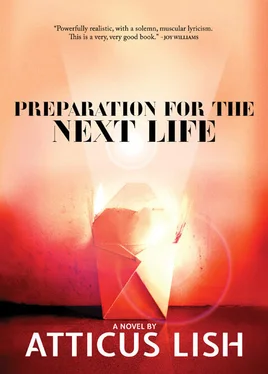Rick pulled out a roll of cash, all hundreds. Here: Take five hundred dollars. He threw money on the pool table. The house painter folded his jewelry up in a bandana, looked over his shoulder, folded it up and put it away.
Who’s the toughest guy in this bar?
You are, Rick.
On the street, Stan, from Alaska by way of North Carolina, was telling Jimmy about the automatic ninety days they gave you in Orlando. I was lying on a bench and there was a bottle nearby — it wasn’t mine. The biggest building in Orlando is the jail. Jail has gone corporate in this country.
The neighborhood has changed, Jimmy said.
The Chinese, they’re taking advantage of our religious freedoms. Why do you need thirteen churches on one block?
He had drunk boilermakers with Pat Murphy back in the day. That was his drink, your dad. A boilermaker man. Hey, Gladys, Gladdie. When was the last time you saw Pat?
Pat? Patrick Murphy? I saw him at St. Andrews. That’s his kid right there. Wait, he was right there.
He’s right here. I’m talkin to him.
Oh, my mistake. Hey. I thought you were there. What’s up, how you doin? Jimmy! Aw, c’mere!
She hugged him with her ropey arms, wearing a black tank top, with her large nose and ghoul’s face. Ya gotta light? So, she said, blowing out her smoke, When I heard you was back, I said it’s about fuckin time.
Jimmy blew out his smoke, nodded down to her, glanced at the street.
This is a good area, but we’re getting bought out.
Skinner was asleep in his room when he was awakened by a sound. It was eleven in the morning and the house was otherwise quiet. A diffuse gray light devoid of shadows came in the grating. He had fallen asleep four hours ago and his last memory was of birds trilling in the dawn. He heard the sound again, got up and opened his door and saw Jimmy looking under his sink.
You again, he thought.
He went behind him to the refrigerator, took a beer out. Neither man spoke in the fifteen-by-ten-foot kitchen. The other’s hunched shoulders and long hair moved beneath the sink. Skinner went back into his room and put his headphones on. He would forget everything staring at the wall. He would be like that for hours, dealing with his depression.
There was nothing ever wrong with the sink, he said later. Why mess with it?
And he crushed his empty beer can and dropped it on the floor.
As time went by, he would notice that sometimes during the quiet part of the day when no one was around, he would hear soft sounds coming from somewhere overhead, possibly the landing. They were very faint and subtle, so he didn’t pay any attention to them, but they would continue, their location seeming to shift, and he would think that they were coming from the basement. But this could have been his imagination. He was usually too depressed to get up and look. By the time he did, he never saw anything or anyone. He thought he was hearing things because of mefloquine. The whole thing was so vague, it didn’t mean anything until later.
SHE WAS LEARNING CANTONESE because she had to. Gwat was bone and river rice meant slippery noodles, tuber stem of water lily, fatty meat and offcuts of the pork. She greeted Rambo in Cantonese and he ignored her, told her to mop the floor. She learned to say, Hougeng, which meant wonderful. Hougeng! she said as she fetched the mop. She said it whenever they made her do something. She found herself saying it all the time.
She took a place on line without asking and started serving in the middle of the rush. She felt Sassoon watching her dipping Thousand Island dressing on a customer’s chunks of iceberg lettuce. She piled rice next to the meat in its jellied brown sauce and handed the dinner plate across the counter.
In her heart, she believed she was more Chinese than they were because the army was the marrow of the nation and she stood at parade rest behind the line while they slouched and texted on their phones, but China was a big nation.
Satay, made with onions, garlic, krill, and soy sauce, was pronounced sa-de in their dialect.
She overheard Angela telling her friend he ought to come to work at the restaurant as a summer job. The friend was a tall young man from Hong Kong who had been in her sister’s class in high school in Jamaica, Queens. The boss would hire him on her say-so, Angela said. We’ve got lots of room here. Daifong meant room. Zou Lei understood this.
She had spent years surviving around people she didn’t like and couldn’t understand. Her coworkers believed that blacks had large but nonworking penises, like dragons in southern superstition. She learned they called them jiekwan.
She couldn’t understand what a customer was telling her — whatever he was saying sounded very strange, the f’s and h’s were switched — and she leaned over the counter and asked him as quietly as she could if he spoke the common language.
Midway through the rush, Sunnie bustled in and Sassoon told Zou Lei, You can go now.
Hahaha, Angela said. You should see your face.
When she left the mall in the evening, the streets were awash with people coming off the buses, coming out of the subway station with every roar of the train coming in, welling up onto the street in waves. After a long shift, she had a great feeling of disorientation and had to get reacquainted with everything. The markets stood tilted by the weight of the produce trucked in from Sinaloa in the dusk. There was the money she had saved in her pocket against her hip — the point of her sixty-hour weeks down in the kitchen. She could feel the folded bills through her worn-thin pocket liner, touching her underwear, her skin. The faint outline of her progress.
She went to see him, prepared to talk about their plans, and as soon as she saw him, misgiving filled her. His room was heavy with the smell of sweat and smoke. He had been sitting for hours doing absolutely nothing.
I don’t think it’s good, she said.
I do, he said, staring sideways, his jaw working.
She was sitting on the corner of his bed — the only place to sit — wearing her jeans and torn t-shirt. She could feel her face getting older in his presence, the lines deepening by her mouth. For a moment, she observed him, wondering what to say.
Summer will be here. The sun will be shining bright, she said and grabbed his hard clammy white bare foot with her discolored calloused hand.
He did not answer.
Take a walk with me.
Skinner took his Marlboros off the bedside table, shook the pack, and caught a cigarette on his lip.
I don’t think so.
He was muscled and tattooed, but his shirt was off and there was a fold in the fat across his stomach, and even the permanently tanned parts of his body were turning the color of cigarette smoke.
Skinner.
What?
Did you take the meds?
Yes. I even drank the Chinese crap, I had two cups of it and it doesn’t do anything. Nothing does anything.
They sat with that statement for a while.
I won’t give up, she finally said. Will you? She touched his foot again. I think you promise to me. Do you remember?
What if — here was a thought that just came to her — he simply drove ahead, in military style, as if there were nothing wrong with him?
I think you can get the job.
He was sitting with one leg out, one leg bent, his thick Gothic-lettered forearm resting on his knee, the cigarette now burning in his fingers. The leg of his boxers hung open and she could see his genitals. He did not respond to her. He dragged on the cigarette, his brow knitted, and blew the smoke out, watched it spread, held the cigarette sideways while it burned and blew on it, made it glow, as if he intended to use it to start a larger fire, which would be instrumental in their survival in a manner she did not yet understand.
Читать дальше












